HC2121: Business Ethics and Social Responsibility Essay, T1 2019
VerifiedAdded on 2022/11/15
|11
|2066
|383
Essay
AI Summary
This essay provides a comprehensive overview of business ethics and social responsibility, examining ethical issues such as accounting, technology, social media, and discrimination within the Australian business context. It delves into the individual decision-making process, exploring moral sensitivity, judgment, focus, and action, as well as cognitive dissonance. The essay further analyzes various ethical moral philosophies, including ancient Greek ethics, normative ethics, meta-ethics, descriptive ethics, and applied ethics, offering a comparative perspective. The author emphasizes the importance of ethical behavior in making sound decisions, avoiding immoral management, and adhering to regulations. The paper concludes by highlighting the significance of ethical practices for business success and societal well-being, supported by a detailed reference list.
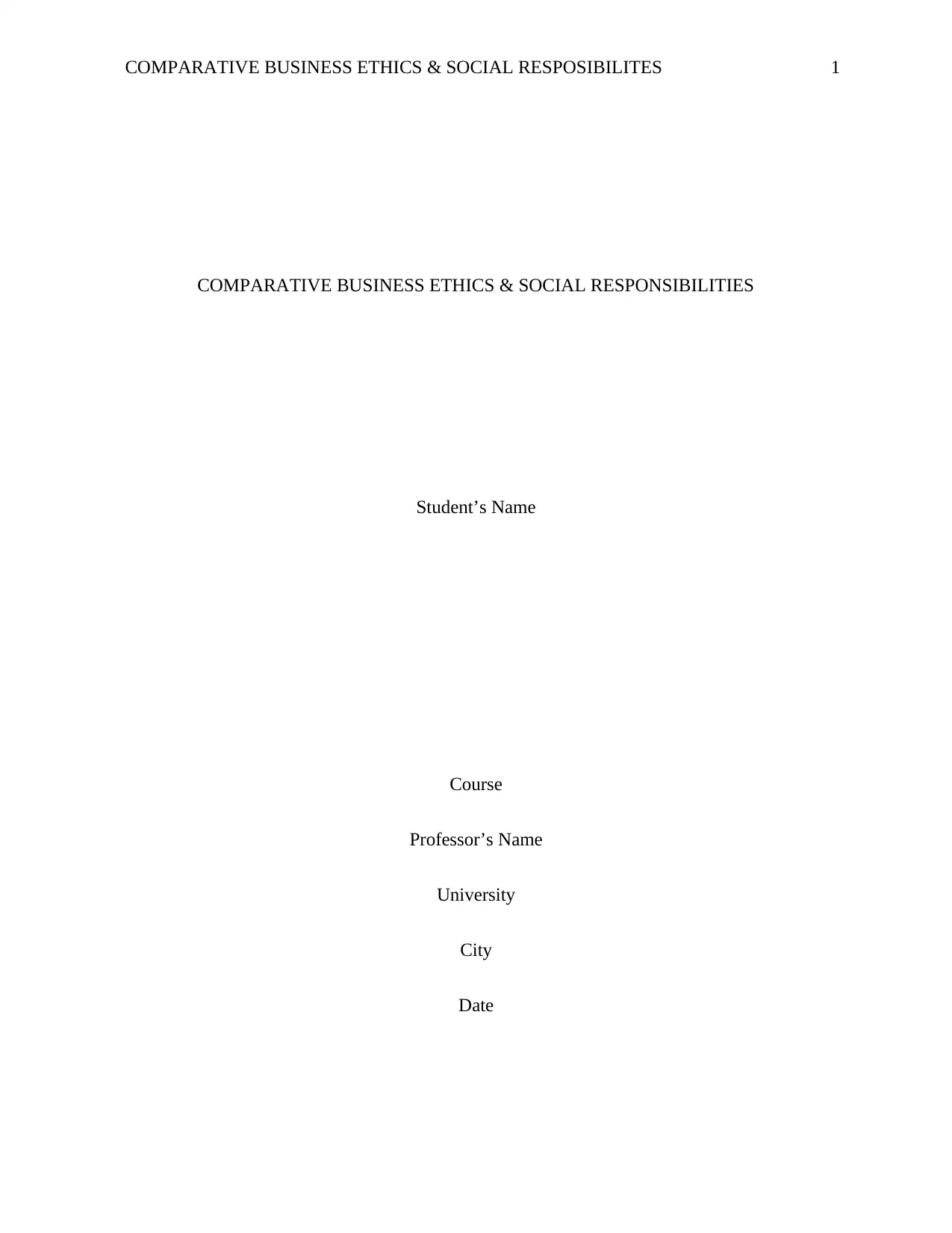
COMPARATIVE BUSINESS ETHICS & SOCIAL RESPOSIBILITES 1
COMPARATIVE BUSINESS ETHICS & SOCIAL RESPONSIBILITIES
Student’s Name
Course
Professor’s Name
University
City
Date
COMPARATIVE BUSINESS ETHICS & SOCIAL RESPONSIBILITIES
Student’s Name
Course
Professor’s Name
University
City
Date
Paraphrase This Document
Need a fresh take? Get an instant paraphrase of this document with our AI Paraphraser
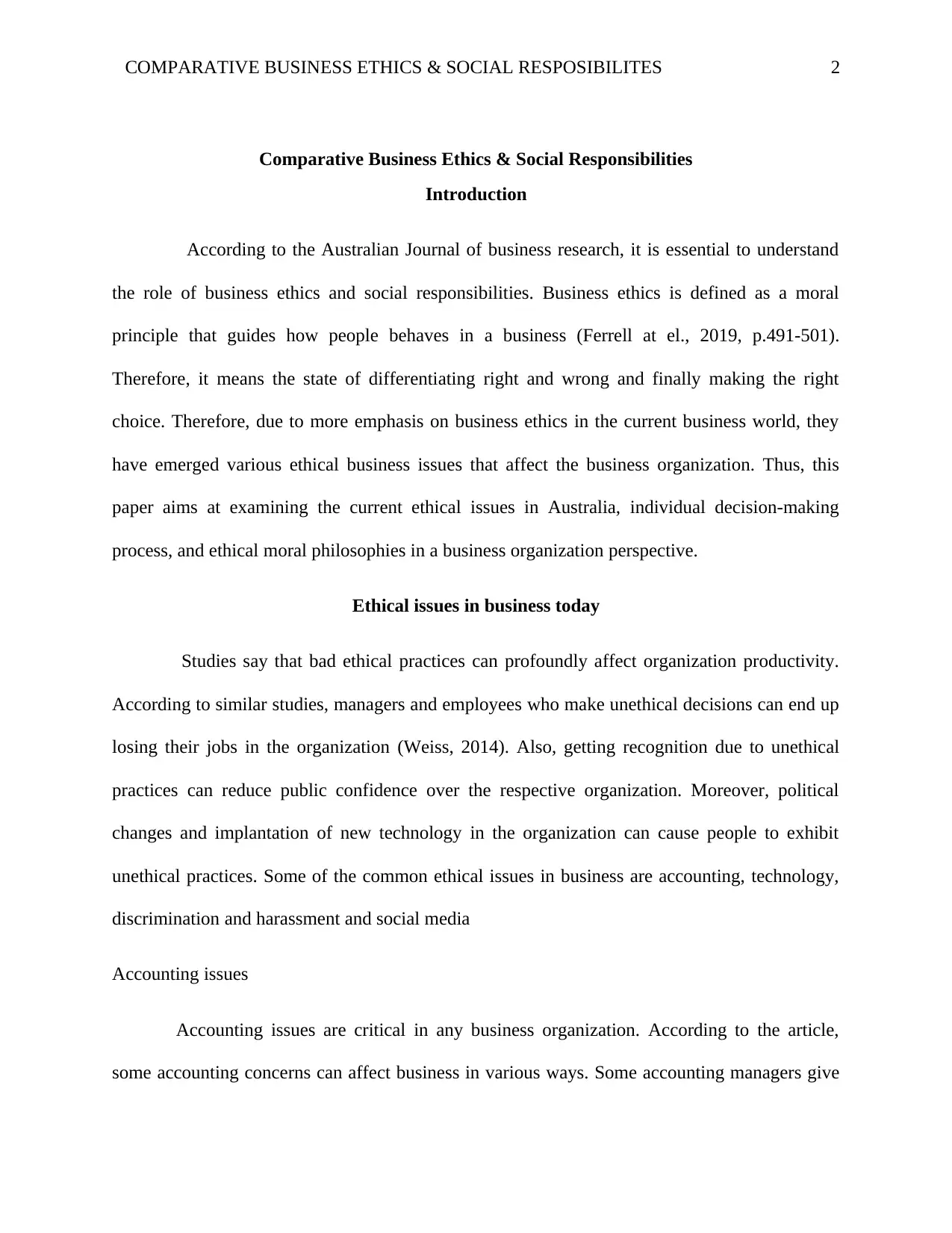
COMPARATIVE BUSINESS ETHICS & SOCIAL RESPOSIBILITES 2
Comparative Business Ethics & Social Responsibilities
Introduction
According to the Australian Journal of business research, it is essential to understand
the role of business ethics and social responsibilities. Business ethics is defined as a moral
principle that guides how people behaves in a business (Ferrell at el., 2019, p.491-501).
Therefore, it means the state of differentiating right and wrong and finally making the right
choice. Therefore, due to more emphasis on business ethics in the current business world, they
have emerged various ethical business issues that affect the business organization. Thus, this
paper aims at examining the current ethical issues in Australia, individual decision-making
process, and ethical moral philosophies in a business organization perspective.
Ethical issues in business today
Studies say that bad ethical practices can profoundly affect organization productivity.
According to similar studies, managers and employees who make unethical decisions can end up
losing their jobs in the organization (Weiss, 2014). Also, getting recognition due to unethical
practices can reduce public confidence over the respective organization. Moreover, political
changes and implantation of new technology in the organization can cause people to exhibit
unethical practices. Some of the common ethical issues in business are accounting, technology,
discrimination and harassment and social media
Accounting issues
Accounting issues are critical in any business organization. According to the article,
some accounting concerns can affect business in various ways. Some accounting managers give
Comparative Business Ethics & Social Responsibilities
Introduction
According to the Australian Journal of business research, it is essential to understand
the role of business ethics and social responsibilities. Business ethics is defined as a moral
principle that guides how people behaves in a business (Ferrell at el., 2019, p.491-501).
Therefore, it means the state of differentiating right and wrong and finally making the right
choice. Therefore, due to more emphasis on business ethics in the current business world, they
have emerged various ethical business issues that affect the business organization. Thus, this
paper aims at examining the current ethical issues in Australia, individual decision-making
process, and ethical moral philosophies in a business organization perspective.
Ethical issues in business today
Studies say that bad ethical practices can profoundly affect organization productivity.
According to similar studies, managers and employees who make unethical decisions can end up
losing their jobs in the organization (Weiss, 2014). Also, getting recognition due to unethical
practices can reduce public confidence over the respective organization. Moreover, political
changes and implantation of new technology in the organization can cause people to exhibit
unethical practices. Some of the common ethical issues in business are accounting, technology,
discrimination and harassment and social media
Accounting issues
Accounting issues are critical in any business organization. According to the article,
some accounting concerns can affect business in various ways. Some accounting managers give
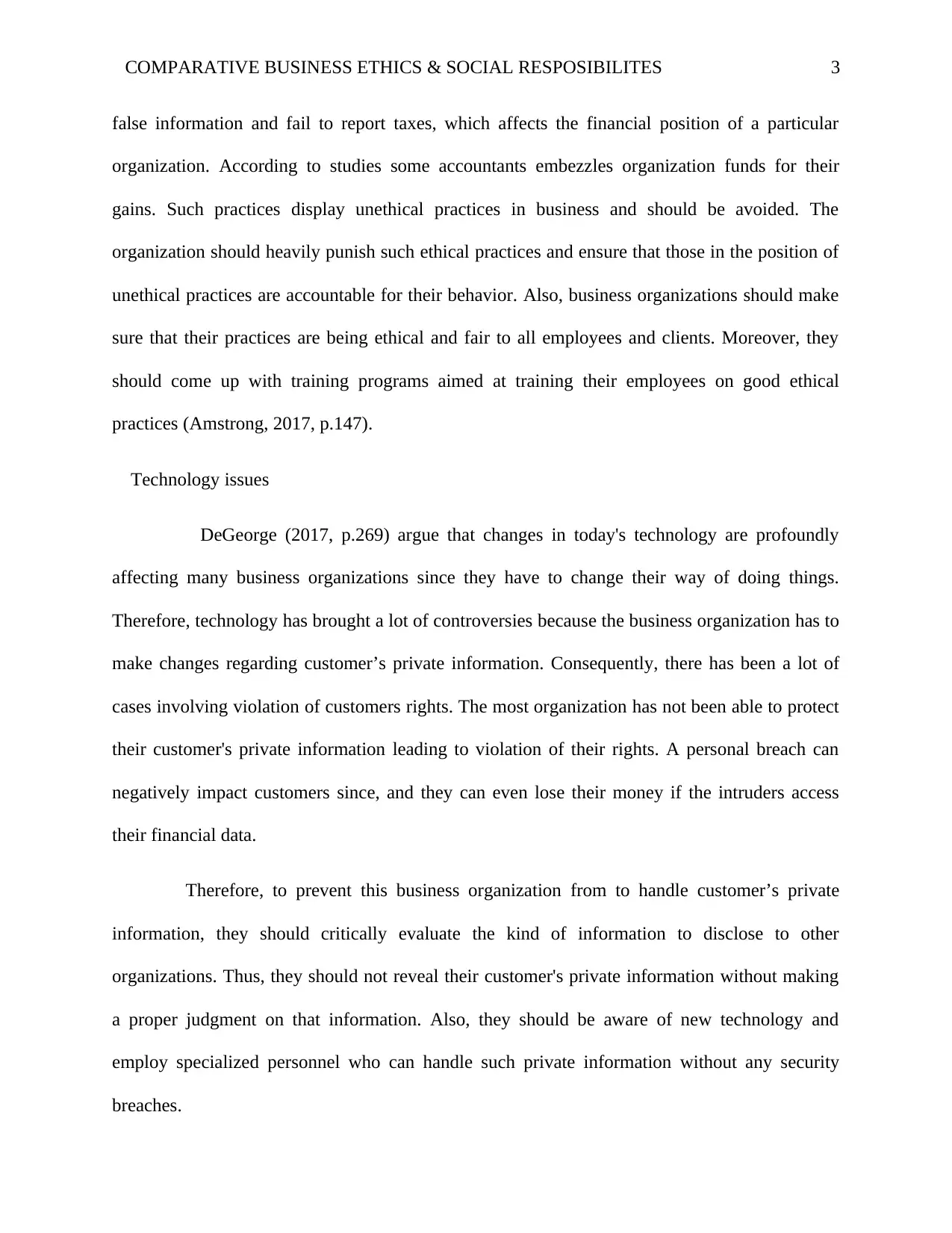
COMPARATIVE BUSINESS ETHICS & SOCIAL RESPOSIBILITES 3
false information and fail to report taxes, which affects the financial position of a particular
organization. According to studies some accountants embezzles organization funds for their
gains. Such practices display unethical practices in business and should be avoided. The
organization should heavily punish such ethical practices and ensure that those in the position of
unethical practices are accountable for their behavior. Also, business organizations should make
sure that their practices are being ethical and fair to all employees and clients. Moreover, they
should come up with training programs aimed at training their employees on good ethical
practices (Amstrong, 2017, p.147).
Technology issues
DeGeorge (2017, p.269) argue that changes in today's technology are profoundly
affecting many business organizations since they have to change their way of doing things.
Therefore, technology has brought a lot of controversies because the business organization has to
make changes regarding customer’s private information. Consequently, there has been a lot of
cases involving violation of customers rights. The most organization has not been able to protect
their customer's private information leading to violation of their rights. A personal breach can
negatively impact customers since, and they can even lose their money if the intruders access
their financial data.
Therefore, to prevent this business organization from to handle customer’s private
information, they should critically evaluate the kind of information to disclose to other
organizations. Thus, they should not reveal their customer's private information without making
a proper judgment on that information. Also, they should be aware of new technology and
employ specialized personnel who can handle such private information without any security
breaches.
false information and fail to report taxes, which affects the financial position of a particular
organization. According to studies some accountants embezzles organization funds for their
gains. Such practices display unethical practices in business and should be avoided. The
organization should heavily punish such ethical practices and ensure that those in the position of
unethical practices are accountable for their behavior. Also, business organizations should make
sure that their practices are being ethical and fair to all employees and clients. Moreover, they
should come up with training programs aimed at training their employees on good ethical
practices (Amstrong, 2017, p.147).
Technology issues
DeGeorge (2017, p.269) argue that changes in today's technology are profoundly
affecting many business organizations since they have to change their way of doing things.
Therefore, technology has brought a lot of controversies because the business organization has to
make changes regarding customer’s private information. Consequently, there has been a lot of
cases involving violation of customers rights. The most organization has not been able to protect
their customer's private information leading to violation of their rights. A personal breach can
negatively impact customers since, and they can even lose their money if the intruders access
their financial data.
Therefore, to prevent this business organization from to handle customer’s private
information, they should critically evaluate the kind of information to disclose to other
organizations. Thus, they should not reveal their customer's private information without making
a proper judgment on that information. Also, they should be aware of new technology and
employ specialized personnel who can handle such private information without any security
breaches.
⊘ This is a preview!⊘
Do you want full access?
Subscribe today to unlock all pages.

Trusted by 1+ million students worldwide
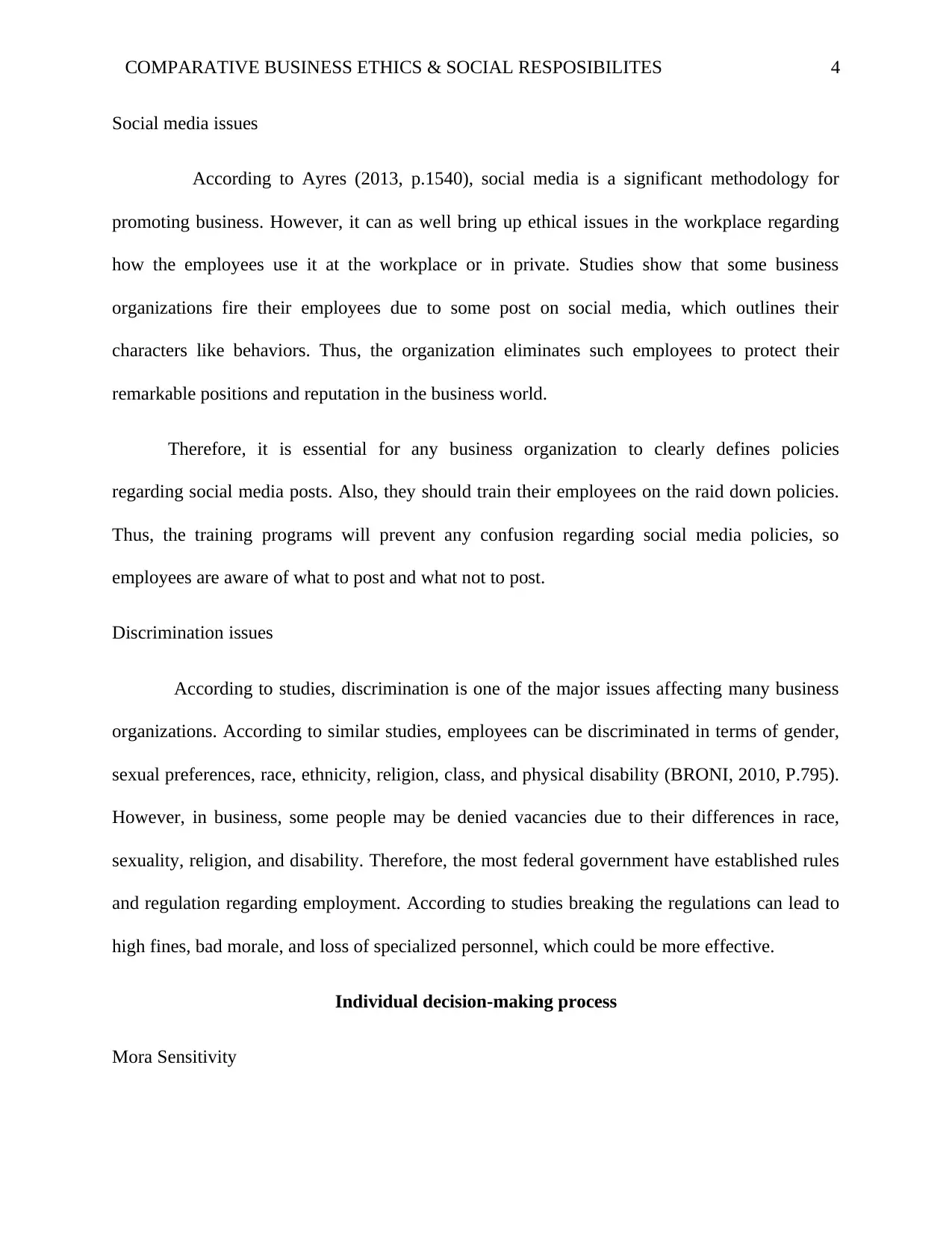
COMPARATIVE BUSINESS ETHICS & SOCIAL RESPOSIBILITES 4
Social media issues
According to Ayres (2013, p.1540), social media is a significant methodology for
promoting business. However, it can as well bring up ethical issues in the workplace regarding
how the employees use it at the workplace or in private. Studies show that some business
organizations fire their employees due to some post on social media, which outlines their
characters like behaviors. Thus, the organization eliminates such employees to protect their
remarkable positions and reputation in the business world.
Therefore, it is essential for any business organization to clearly defines policies
regarding social media posts. Also, they should train their employees on the raid down policies.
Thus, the training programs will prevent any confusion regarding social media policies, so
employees are aware of what to post and what not to post.
Discrimination issues
According to studies, discrimination is one of the major issues affecting many business
organizations. According to similar studies, employees can be discriminated in terms of gender,
sexual preferences, race, ethnicity, religion, class, and physical disability (BRONI, 2010, P.795).
However, in business, some people may be denied vacancies due to their differences in race,
sexuality, religion, and disability. Therefore, the most federal government have established rules
and regulation regarding employment. According to studies breaking the regulations can lead to
high fines, bad morale, and loss of specialized personnel, which could be more effective.
Individual decision-making process
Mora Sensitivity
Social media issues
According to Ayres (2013, p.1540), social media is a significant methodology for
promoting business. However, it can as well bring up ethical issues in the workplace regarding
how the employees use it at the workplace or in private. Studies show that some business
organizations fire their employees due to some post on social media, which outlines their
characters like behaviors. Thus, the organization eliminates such employees to protect their
remarkable positions and reputation in the business world.
Therefore, it is essential for any business organization to clearly defines policies
regarding social media posts. Also, they should train their employees on the raid down policies.
Thus, the training programs will prevent any confusion regarding social media policies, so
employees are aware of what to post and what not to post.
Discrimination issues
According to studies, discrimination is one of the major issues affecting many business
organizations. According to similar studies, employees can be discriminated in terms of gender,
sexual preferences, race, ethnicity, religion, class, and physical disability (BRONI, 2010, P.795).
However, in business, some people may be denied vacancies due to their differences in race,
sexuality, religion, and disability. Therefore, the most federal government have established rules
and regulation regarding employment. According to studies breaking the regulations can lead to
high fines, bad morale, and loss of specialized personnel, which could be more effective.
Individual decision-making process
Mora Sensitivity
Paraphrase This Document
Need a fresh take? Get an instant paraphrase of this document with our AI Paraphraser
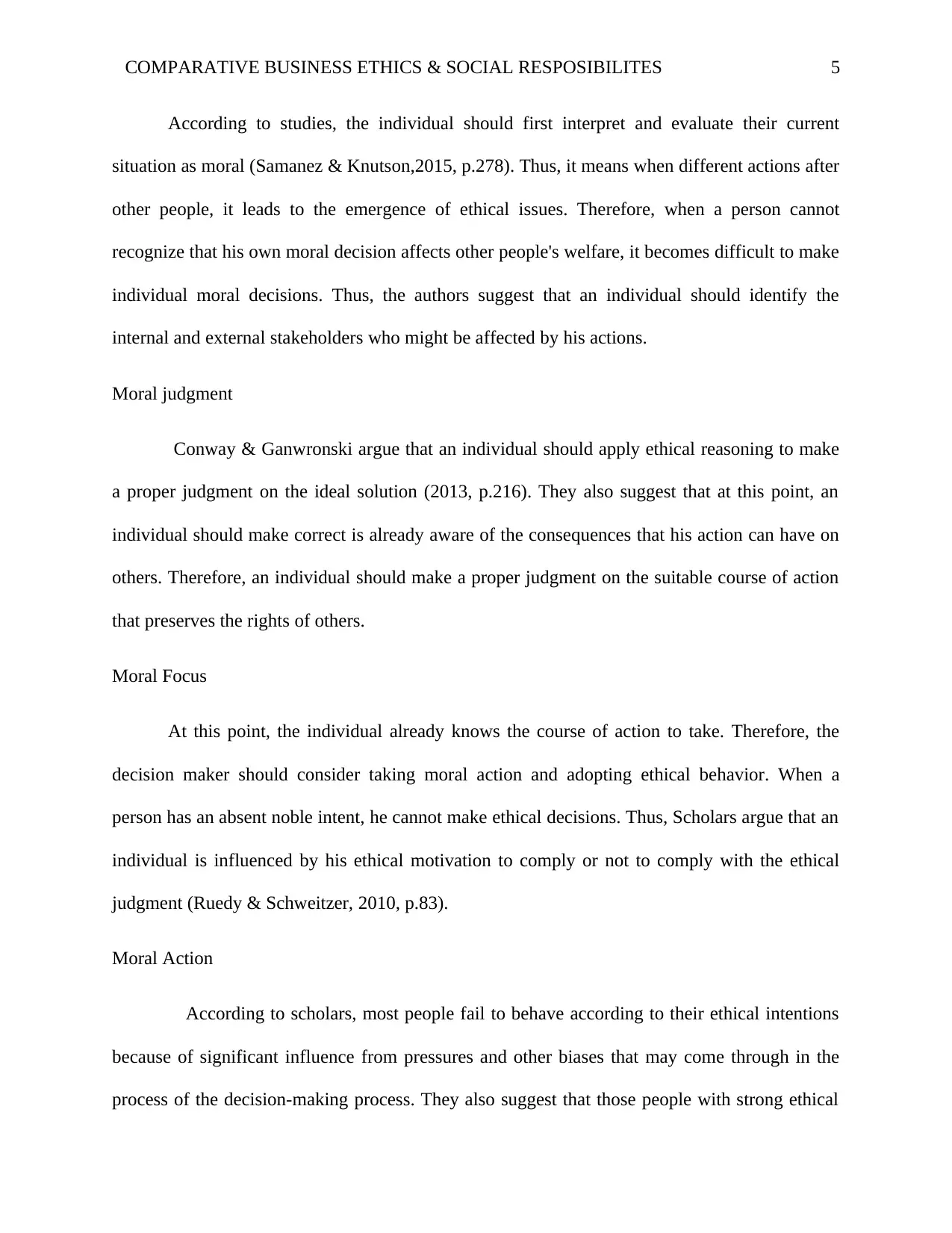
COMPARATIVE BUSINESS ETHICS & SOCIAL RESPOSIBILITES 5
According to studies, the individual should first interpret and evaluate their current
situation as moral (Samanez & Knutson,2015, p.278). Thus, it means when different actions after
other people, it leads to the emergence of ethical issues. Therefore, when a person cannot
recognize that his own moral decision affects other people's welfare, it becomes difficult to make
individual moral decisions. Thus, the authors suggest that an individual should identify the
internal and external stakeholders who might be affected by his actions.
Moral judgment
Conway & Ganwronski argue that an individual should apply ethical reasoning to make
a proper judgment on the ideal solution (2013, p.216). They also suggest that at this point, an
individual should make correct is already aware of the consequences that his action can have on
others. Therefore, an individual should make a proper judgment on the suitable course of action
that preserves the rights of others.
Moral Focus
At this point, the individual already knows the course of action to take. Therefore, the
decision maker should consider taking moral action and adopting ethical behavior. When a
person has an absent noble intent, he cannot make ethical decisions. Thus, Scholars argue that an
individual is influenced by his ethical motivation to comply or not to comply with the ethical
judgment (Ruedy & Schweitzer, 2010, p.83).
Moral Action
According to scholars, most people fail to behave according to their ethical intentions
because of significant influence from pressures and other biases that may come through in the
process of the decision-making process. They also suggest that those people with strong ethical
According to studies, the individual should first interpret and evaluate their current
situation as moral (Samanez & Knutson,2015, p.278). Thus, it means when different actions after
other people, it leads to the emergence of ethical issues. Therefore, when a person cannot
recognize that his own moral decision affects other people's welfare, it becomes difficult to make
individual moral decisions. Thus, the authors suggest that an individual should identify the
internal and external stakeholders who might be affected by his actions.
Moral judgment
Conway & Ganwronski argue that an individual should apply ethical reasoning to make
a proper judgment on the ideal solution (2013, p.216). They also suggest that at this point, an
individual should make correct is already aware of the consequences that his action can have on
others. Therefore, an individual should make a proper judgment on the suitable course of action
that preserves the rights of others.
Moral Focus
At this point, the individual already knows the course of action to take. Therefore, the
decision maker should consider taking moral action and adopting ethical behavior. When a
person has an absent noble intent, he cannot make ethical decisions. Thus, Scholars argue that an
individual is influenced by his ethical motivation to comply or not to comply with the ethical
judgment (Ruedy & Schweitzer, 2010, p.83).
Moral Action
According to scholars, most people fail to behave according to their ethical intentions
because of significant influence from pressures and other biases that may come through in the
process of the decision-making process. They also suggest that those people with strong ethical
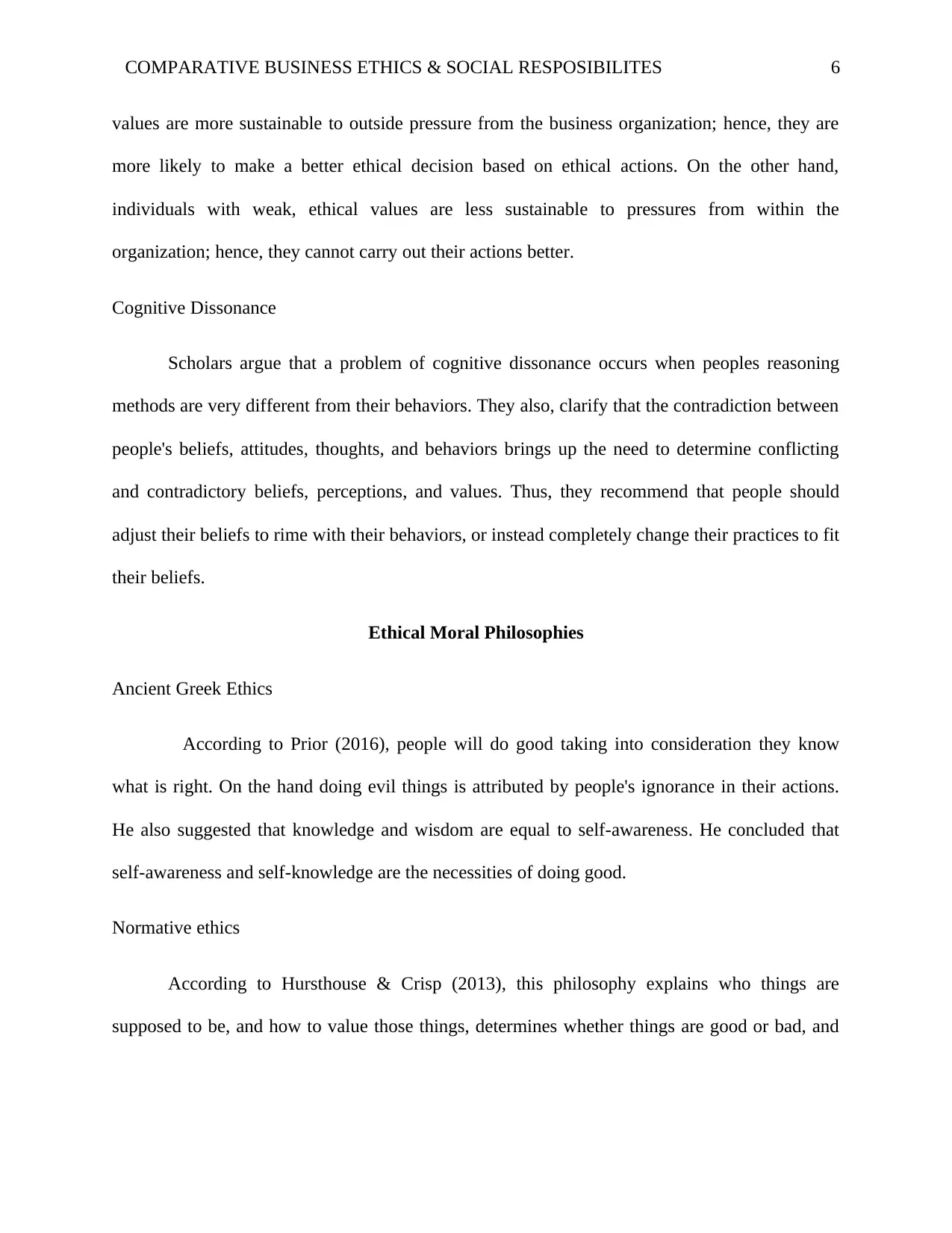
COMPARATIVE BUSINESS ETHICS & SOCIAL RESPOSIBILITES 6
values are more sustainable to outside pressure from the business organization; hence, they are
more likely to make a better ethical decision based on ethical actions. On the other hand,
individuals with weak, ethical values are less sustainable to pressures from within the
organization; hence, they cannot carry out their actions better.
Cognitive Dissonance
Scholars argue that a problem of cognitive dissonance occurs when peoples reasoning
methods are very different from their behaviors. They also, clarify that the contradiction between
people's beliefs, attitudes, thoughts, and behaviors brings up the need to determine conflicting
and contradictory beliefs, perceptions, and values. Thus, they recommend that people should
adjust their beliefs to rime with their behaviors, or instead completely change their practices to fit
their beliefs.
Ethical Moral Philosophies
Ancient Greek Ethics
According to Prior (2016), people will do good taking into consideration they know
what is right. On the hand doing evil things is attributed by people's ignorance in their actions.
He also suggested that knowledge and wisdom are equal to self-awareness. He concluded that
self-awareness and self-knowledge are the necessities of doing good.
Normative ethics
According to Hursthouse & Crisp (2013), this philosophy explains who things are
supposed to be, and how to value those things, determines whether things are good or bad, and
values are more sustainable to outside pressure from the business organization; hence, they are
more likely to make a better ethical decision based on ethical actions. On the other hand,
individuals with weak, ethical values are less sustainable to pressures from within the
organization; hence, they cannot carry out their actions better.
Cognitive Dissonance
Scholars argue that a problem of cognitive dissonance occurs when peoples reasoning
methods are very different from their behaviors. They also, clarify that the contradiction between
people's beliefs, attitudes, thoughts, and behaviors brings up the need to determine conflicting
and contradictory beliefs, perceptions, and values. Thus, they recommend that people should
adjust their beliefs to rime with their behaviors, or instead completely change their practices to fit
their beliefs.
Ethical Moral Philosophies
Ancient Greek Ethics
According to Prior (2016), people will do good taking into consideration they know
what is right. On the hand doing evil things is attributed by people's ignorance in their actions.
He also suggested that knowledge and wisdom are equal to self-awareness. He concluded that
self-awareness and self-knowledge are the necessities of doing good.
Normative ethics
According to Hursthouse & Crisp (2013), this philosophy explains who things are
supposed to be, and how to value those things, determines whether things are good or bad, and
⊘ This is a preview!⊘
Do you want full access?
Subscribe today to unlock all pages.

Trusted by 1+ million students worldwide
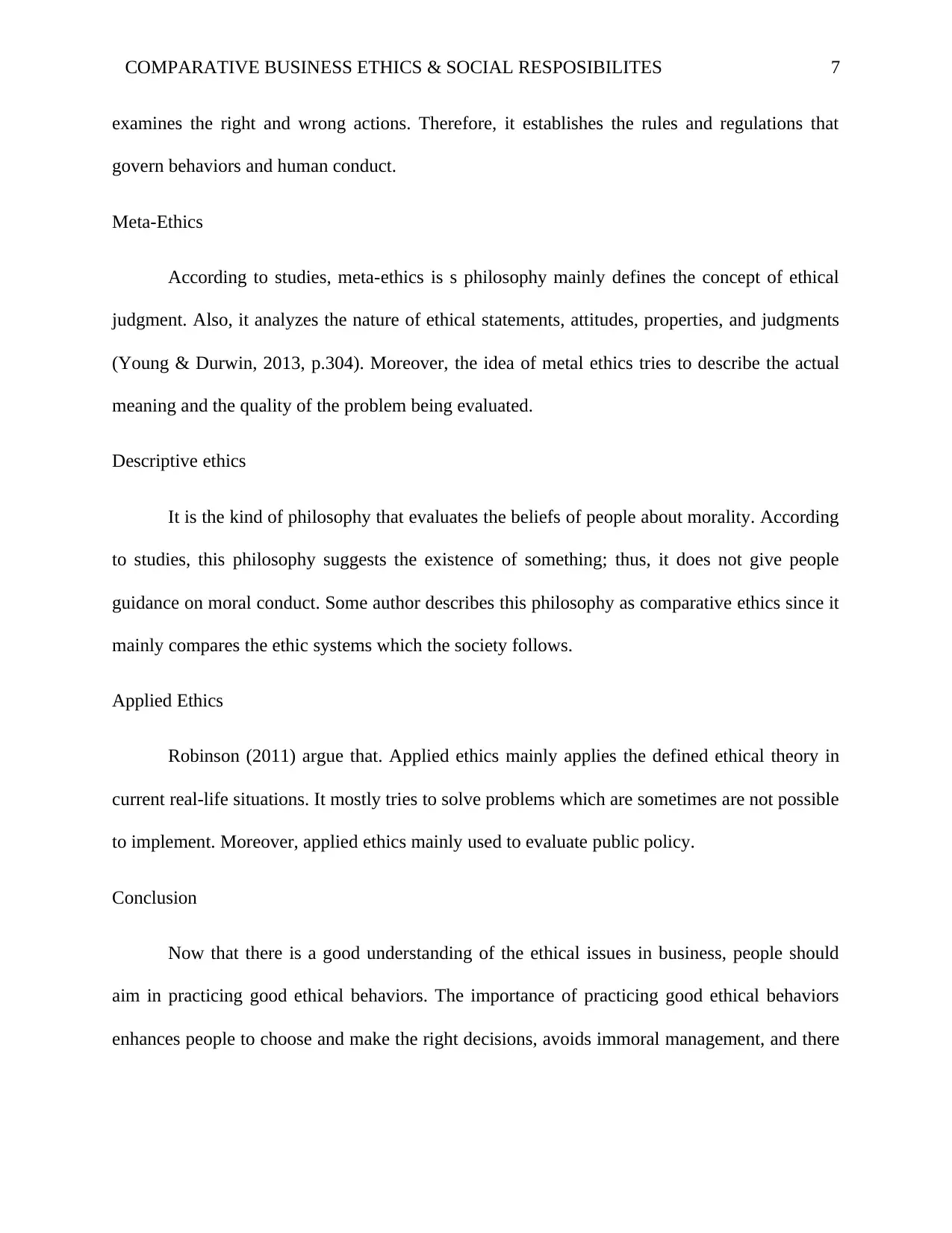
COMPARATIVE BUSINESS ETHICS & SOCIAL RESPOSIBILITES 7
examines the right and wrong actions. Therefore, it establishes the rules and regulations that
govern behaviors and human conduct.
Meta-Ethics
According to studies, meta-ethics is s philosophy mainly defines the concept of ethical
judgment. Also, it analyzes the nature of ethical statements, attitudes, properties, and judgments
(Young & Durwin, 2013, p.304). Moreover, the idea of metal ethics tries to describe the actual
meaning and the quality of the problem being evaluated.
Descriptive ethics
It is the kind of philosophy that evaluates the beliefs of people about morality. According
to studies, this philosophy suggests the existence of something; thus, it does not give people
guidance on moral conduct. Some author describes this philosophy as comparative ethics since it
mainly compares the ethic systems which the society follows.
Applied Ethics
Robinson (2011) argue that. Applied ethics mainly applies the defined ethical theory in
current real-life situations. It mostly tries to solve problems which are sometimes are not possible
to implement. Moreover, applied ethics mainly used to evaluate public policy.
Conclusion
Now that there is a good understanding of the ethical issues in business, people should
aim in practicing good ethical behaviors. The importance of practicing good ethical behaviors
enhances people to choose and make the right decisions, avoids immoral management, and there
examines the right and wrong actions. Therefore, it establishes the rules and regulations that
govern behaviors and human conduct.
Meta-Ethics
According to studies, meta-ethics is s philosophy mainly defines the concept of ethical
judgment. Also, it analyzes the nature of ethical statements, attitudes, properties, and judgments
(Young & Durwin, 2013, p.304). Moreover, the idea of metal ethics tries to describe the actual
meaning and the quality of the problem being evaluated.
Descriptive ethics
It is the kind of philosophy that evaluates the beliefs of people about morality. According
to studies, this philosophy suggests the existence of something; thus, it does not give people
guidance on moral conduct. Some author describes this philosophy as comparative ethics since it
mainly compares the ethic systems which the society follows.
Applied Ethics
Robinson (2011) argue that. Applied ethics mainly applies the defined ethical theory in
current real-life situations. It mostly tries to solve problems which are sometimes are not possible
to implement. Moreover, applied ethics mainly used to evaluate public policy.
Conclusion
Now that there is a good understanding of the ethical issues in business, people should
aim in practicing good ethical behaviors. The importance of practicing good ethical behaviors
enhances people to choose and make the right decisions, avoids immoral management, and there
Paraphrase This Document
Need a fresh take? Get an instant paraphrase of this document with our AI Paraphraser
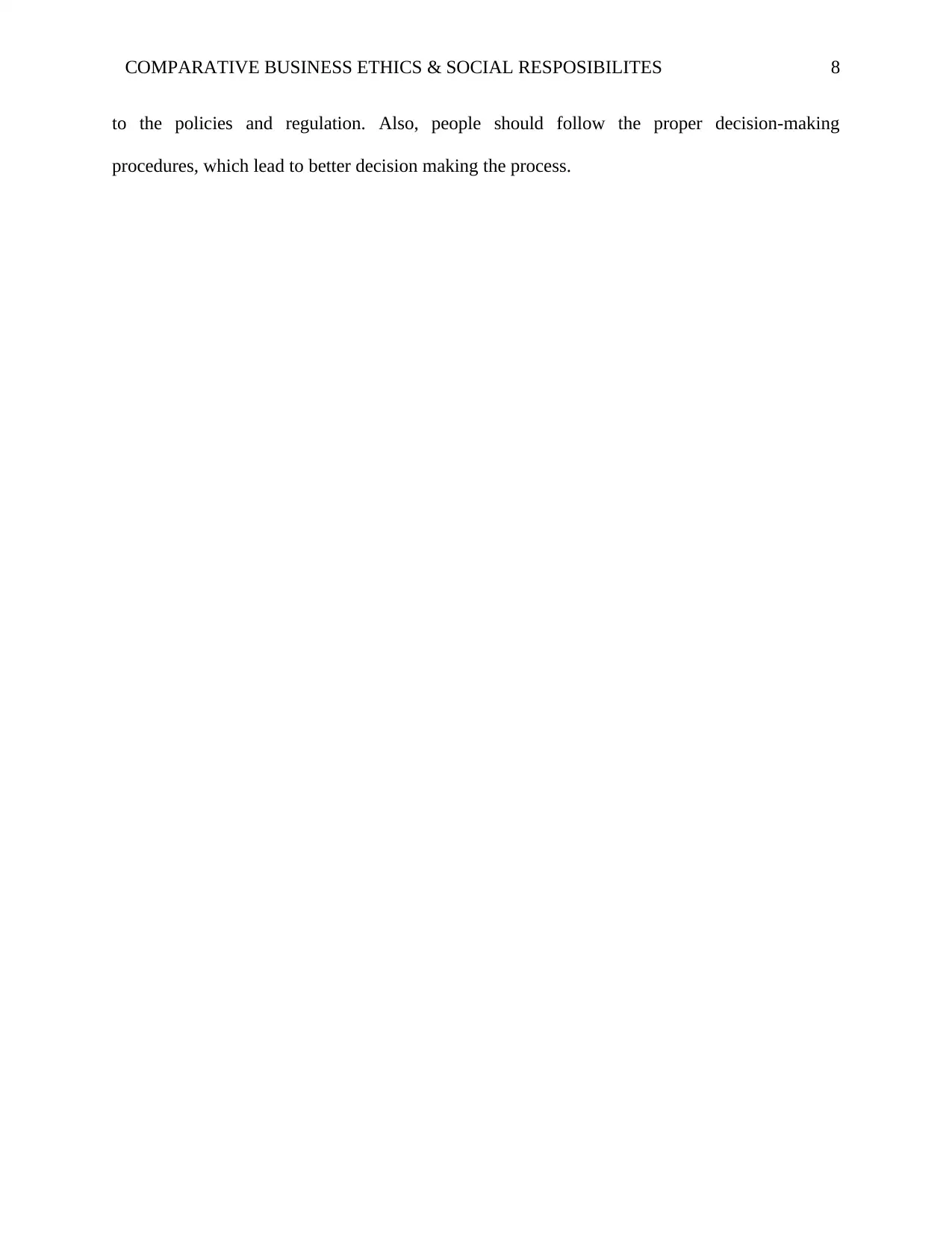
COMPARATIVE BUSINESS ETHICS & SOCIAL RESPOSIBILITES 8
to the policies and regulation. Also, people should follow the proper decision-making
procedures, which lead to better decision making the process.
to the policies and regulation. Also, people should follow the proper decision-making
procedures, which lead to better decision making the process.
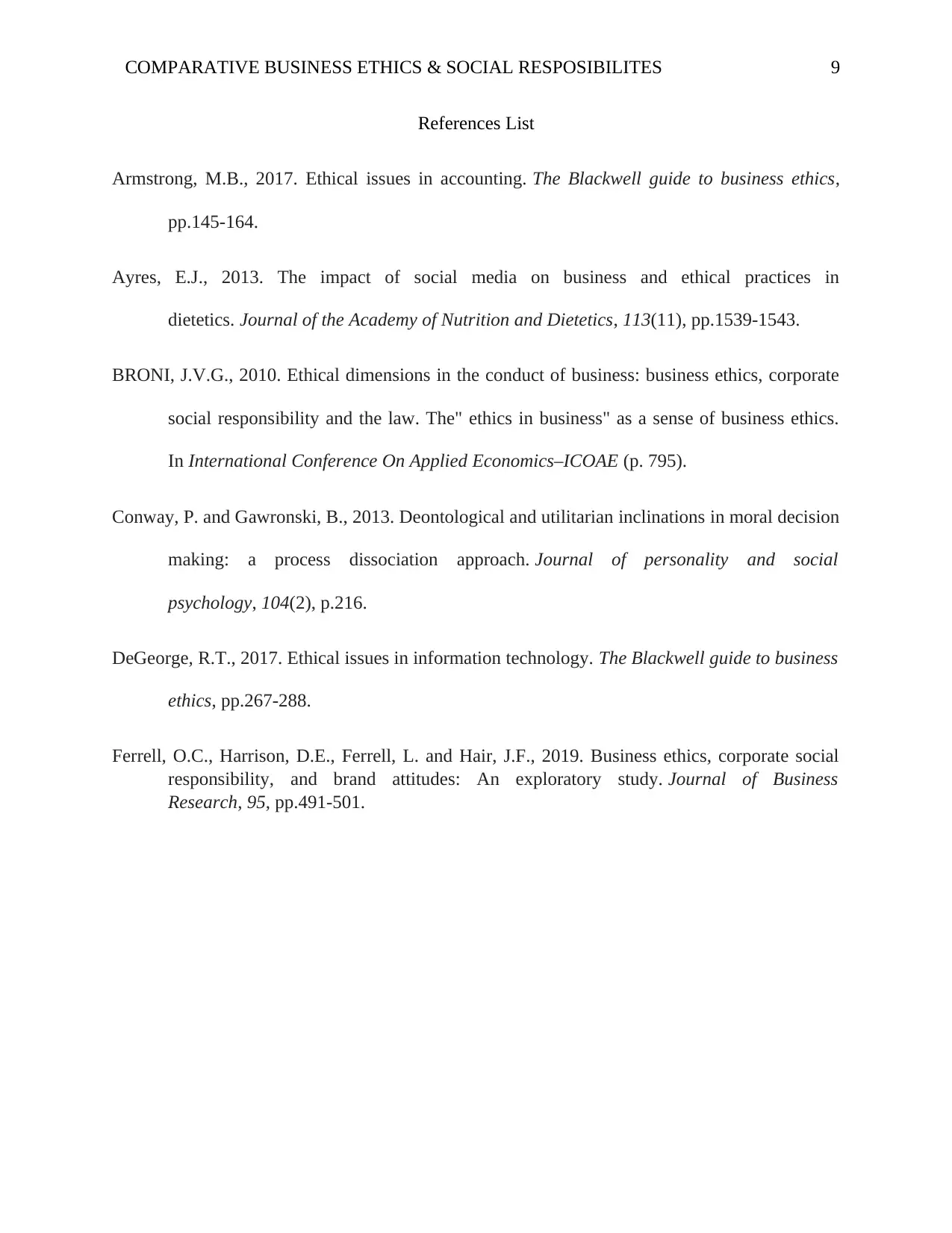
COMPARATIVE BUSINESS ETHICS & SOCIAL RESPOSIBILITES 9
References List
Armstrong, M.B., 2017. Ethical issues in accounting. The Blackwell guide to business ethics,
pp.145-164.
Ayres, E.J., 2013. The impact of social media on business and ethical practices in
dietetics. Journal of the Academy of Nutrition and Dietetics, 113(11), pp.1539-1543.
BRONI, J.V.G., 2010. Ethical dimensions in the conduct of business: business ethics, corporate
social responsibility and the law. The" ethics in business" as a sense of business ethics.
In International Conference On Applied Economics–ICOAE (p. 795).
Conway, P. and Gawronski, B., 2013. Deontological and utilitarian inclinations in moral decision
making: a process dissociation approach. Journal of personality and social
psychology, 104(2), p.216.
DeGeorge, R.T., 2017. Ethical issues in information technology. The Blackwell guide to business
ethics, pp.267-288.
Ferrell, O.C., Harrison, D.E., Ferrell, L. and Hair, J.F., 2019. Business ethics, corporate social
responsibility, and brand attitudes: An exploratory study. Journal of Business
Research, 95, pp.491-501.
References List
Armstrong, M.B., 2017. Ethical issues in accounting. The Blackwell guide to business ethics,
pp.145-164.
Ayres, E.J., 2013. The impact of social media on business and ethical practices in
dietetics. Journal of the Academy of Nutrition and Dietetics, 113(11), pp.1539-1543.
BRONI, J.V.G., 2010. Ethical dimensions in the conduct of business: business ethics, corporate
social responsibility and the law. The" ethics in business" as a sense of business ethics.
In International Conference On Applied Economics–ICOAE (p. 795).
Conway, P. and Gawronski, B., 2013. Deontological and utilitarian inclinations in moral decision
making: a process dissociation approach. Journal of personality and social
psychology, 104(2), p.216.
DeGeorge, R.T., 2017. Ethical issues in information technology. The Blackwell guide to business
ethics, pp.267-288.
Ferrell, O.C., Harrison, D.E., Ferrell, L. and Hair, J.F., 2019. Business ethics, corporate social
responsibility, and brand attitudes: An exploratory study. Journal of Business
Research, 95, pp.491-501.
⊘ This is a preview!⊘
Do you want full access?
Subscribe today to unlock all pages.

Trusted by 1+ million students worldwide
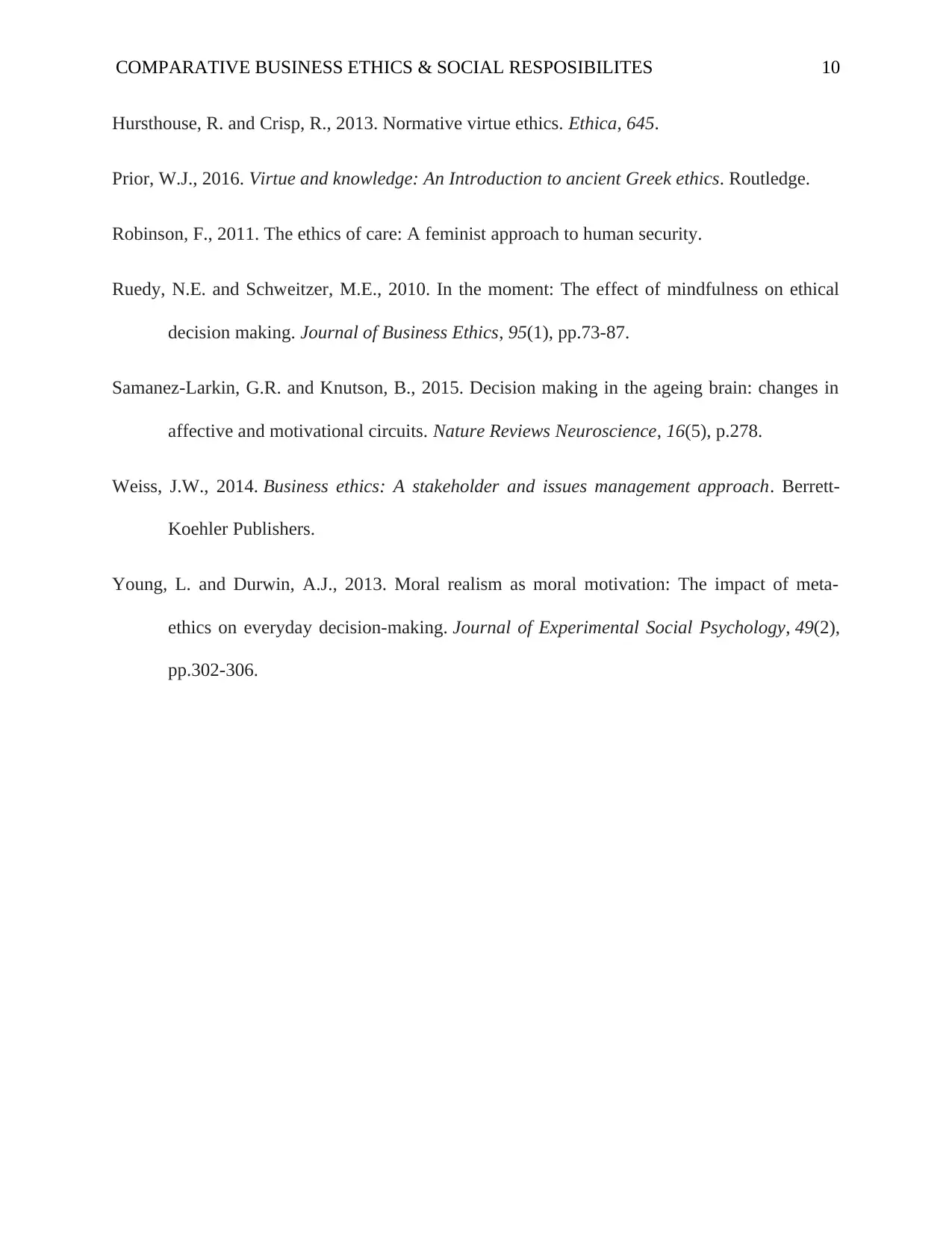
COMPARATIVE BUSINESS ETHICS & SOCIAL RESPOSIBILITES 10
Hursthouse, R. and Crisp, R., 2013. Normative virtue ethics. Ethica, 645.
Prior, W.J., 2016. Virtue and knowledge: An Introduction to ancient Greek ethics. Routledge.
Robinson, F., 2011. The ethics of care: A feminist approach to human security.
Ruedy, N.E. and Schweitzer, M.E., 2010. In the moment: The effect of mindfulness on ethical
decision making. Journal of Business Ethics, 95(1), pp.73-87.
Samanez-Larkin, G.R. and Knutson, B., 2015. Decision making in the ageing brain: changes in
affective and motivational circuits. Nature Reviews Neuroscience, 16(5), p.278.
Weiss, J.W., 2014. Business ethics: A stakeholder and issues management approach. Berrett-
Koehler Publishers.
Young, L. and Durwin, A.J., 2013. Moral realism as moral motivation: The impact of meta-
ethics on everyday decision-making. Journal of Experimental Social Psychology, 49(2),
pp.302-306.
Hursthouse, R. and Crisp, R., 2013. Normative virtue ethics. Ethica, 645.
Prior, W.J., 2016. Virtue and knowledge: An Introduction to ancient Greek ethics. Routledge.
Robinson, F., 2011. The ethics of care: A feminist approach to human security.
Ruedy, N.E. and Schweitzer, M.E., 2010. In the moment: The effect of mindfulness on ethical
decision making. Journal of Business Ethics, 95(1), pp.73-87.
Samanez-Larkin, G.R. and Knutson, B., 2015. Decision making in the ageing brain: changes in
affective and motivational circuits. Nature Reviews Neuroscience, 16(5), p.278.
Weiss, J.W., 2014. Business ethics: A stakeholder and issues management approach. Berrett-
Koehler Publishers.
Young, L. and Durwin, A.J., 2013. Moral realism as moral motivation: The impact of meta-
ethics on everyday decision-making. Journal of Experimental Social Psychology, 49(2),
pp.302-306.
Paraphrase This Document
Need a fresh take? Get an instant paraphrase of this document with our AI Paraphraser
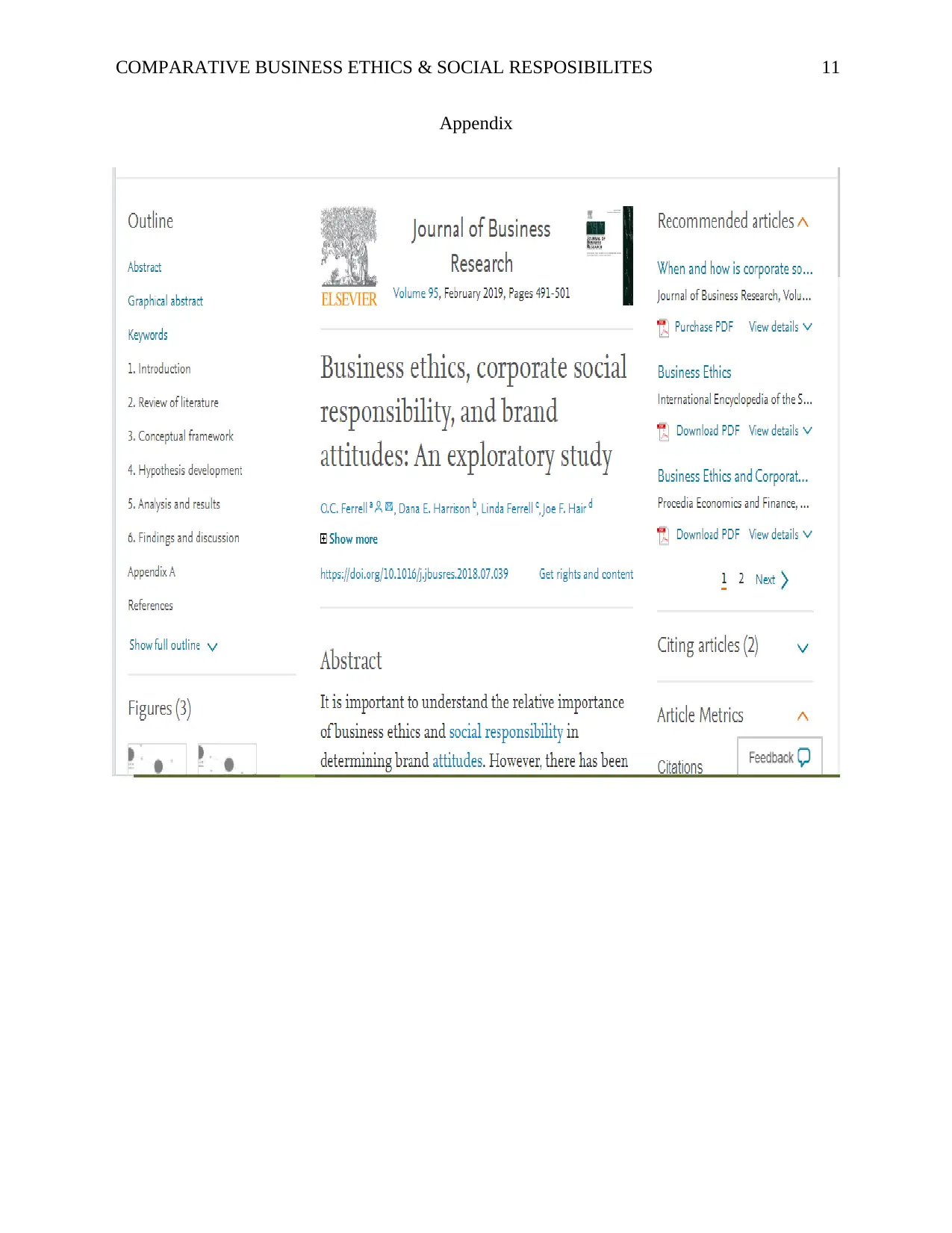
COMPARATIVE BUSINESS ETHICS & SOCIAL RESPOSIBILITES 11
Appendix
Appendix
1 out of 11
Related Documents
Your All-in-One AI-Powered Toolkit for Academic Success.
+13062052269
info@desklib.com
Available 24*7 on WhatsApp / Email
![[object Object]](/_next/static/media/star-bottom.7253800d.svg)
Unlock your academic potential
Copyright © 2020–2026 A2Z Services. All Rights Reserved. Developed and managed by ZUCOL.


